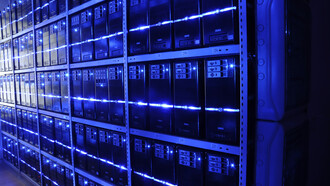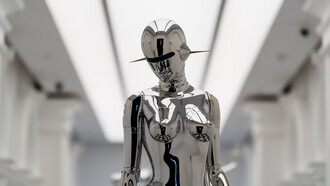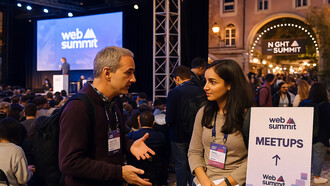Let's resume our interview with Sergio Bellucci.
Artificial intelligence is also based on collecting big data, and the more it has, the more precise its response will be. MIT researchers have developed a program (Sibyl) that uses data from CT scans, MRIs, and X-rays taken around the world in recent years to predict the possibility of developing lung cancer. I saw a video where doctors showed a person a CT scan of the lung where they did not notice anything strange, but the software focused on a particular area. Two years later, this person developed cancer in exactly that spot.
So it is undeniable that there are absolutely positive aspects of AI, and we have seen that its degree of precision is related to the amount of data it absorbs from different sources. Starting from the world of the internet, which is now boundless, from the chats we participate in, from blogs, from the data we provide through social media, or when we buy something online or through likes. Therefore, it has a learning possibility of data acquisition that is practically infinite.
But the data it has access to is provided by humans with prejudices, preconceptions, errors, and mystifications. The same people who work on AI say that this is a danger. So its intelligence is an intelligence that contains all the misunderstandings, mystifications, and preconceptions of us humans. This developed over and over again; the potential of this machine can give rise to enormous errors.
This is one of the aspects of the leap in level that human civilization potentially has ahead of it. The “discovery” of the so-called biases present within the data that humans have produced in their history emerged precisely because we asked ourselves the question of artificial intelligence that accumulates data, but what does it give us back? The image of what we are! In fact, this technology tells us this is you. If, for example, we ask AI to represent the image of a worker in the nursing field, it gives us the image of a woman, a nurse. In the same way, it represents the figure of the doctor with a man, but in reality, we know that this is not the case.
Consequently, we accuse artificial intelligence of having a bias, but that bias is actually present in the structures of society because, coincidentally, doctors are overwhelmingly men, and in any case, in the collective imagination, the doctor is a man, and therefore the problem of bias is in us and not in the machine. So AI shows us a cross-section of how we are. Of course, in cultured discussions, when we are in the presence of the public or in some environments, the problem of gender is already widely addressed, resolved, and taken for granted, but in the overall mass of society, these things are deposited and are there.
For the first time, it is a machine that confronts us with our prejudices and makes us ask ourselves the question of thinking about society differently. It would be wrong if we based the decisions of what we have to do on structures that contain these biases, but it is not that before artificial intelligence those biases did not work! They worked, only that we did not realize it because they were deposited in the brain and in the behaviors of an individual, of a single person, of a single character who made decisions based on his personal biases that he had accumulated during his life. So there is an aspect that is extremely positive that allows us to observe a qualitative aspect of our essence of humanity and to work in much more precise terms.
What is the negative side? That of making biases objective. That is, since the machine distributes them to us, there could be an attitude that would lead us to say, “Well, reality is not a human judgment, but it is a judgment of a machine, and therefore it is objective.”.
This might be the right time to realize that there are no objective things.
For example, I have participated in some meetings with some HR managers of large companies, and they are starting to pay more attention to some aspects thanks to the AI software that is used to facilitate this work that brings out in people these prejudices that, until yesterday, they were not aware of.
So what you say is true, but there is also this aspect that we need to keep in mind. We need to avoid the decisions and the results of the calculations of artificial intelligence becoming objective things. For example, I am very concerned about Biden's decision last year to use the judgment decisions of artificial intelligence and, therefore, to automate the judgment responses, because everything has its own characteristics, and there cannot be an objective and neutral thing.
Therefore, the leap in the relationship in some social functions between the decision that is put in the hands of a person or a machine is a leap in quality of no small importance, but not because the person did not have his biases. Just take what happens in almost all the countries of the world when a foreigner, someone different, is put on trial. Probably, the judge will often have some not small biases that he keeps inside himself; however, since he is a human being, we do not realize it, or we pretend not to realize it.
The difference is that we have our own intelligence, our own way of relating to everything, and we have, in fact, flaws within us. We do damage that can be more or less contained depending also on our social position and on the responsibilities we have. But AI has an almost infinite potential because it would seem that it can get to this point.
It would seem that on the evolutionary scale, artificial intelligence is already very similar to us and could potentially become comparable to the idea that many of us have of divinity. A machine with infinite intelligence that makes decisions on our behalf can be very interesting if we want to use a neutral term, but that can also be devastating. When you set a course for a ship or a plane, very few degrees of difference at the beginning determine exponential errors.
I totally agree with you because humans have some characteristics, such as empathy and compassion. To continue with the previous example, a judge faced with a very complex picture can feel empathy and understand a human aspect of the story that a machine will probably never see. Some call this “objectivity” and therefore a judgment, so to speak, standard, which therefore responds to the assumption of the law being the same for everyone, but in reality, we know perfectly well that human relationships are something more complex and society as a whole is something more complex.
So I completely agree with you on this; there is a qualitative leap that we must pay close attention to. Why did I talk before about the historical leap that occurred with the passage from the instrument to the machine? Because the passage from that phase of the instrument to the phase of the machine has produced epochal ruptures.
I'll give you just one example to help you understand. Up until that time, human communities were supported by rules of operation that were condensed through the accumulation of experience over the centuries in forms, methods, and rules that varied from territory to territory, from city to city, and from country to country. And those rules were codified in tradition. Tradition was important because it was the condensation of these instructions that the community needed to survive. The break with tradition called them into question.
It wasn't a frivolous thing. If you didn't behave according to the rules that the community had built, you were calling into question the life of the community. So you had to abide by the rules.
When a foreigner arrived, there were two possibilities: either he was subjected to the rules and therefore became a valuable element because he was a quantitative contribution to the functioning of a machine that was not questioned, or he introduced a change in the rules that 9 out of 10 were negative or were considered negative, and, consequently, he was expelled or eliminated from the community. If, on the other hand, he was considered a positive contribution, he was incorporated into the tradition, and he became part of it.
This has generated the form of human communities within which there are still residues of these social principles because the evolution around the system of social rules and, therefore, traditions is so strong that we almost struggle not to think about them within a tradition. We can say that it is in our DNA and immediately resurfaces in moments of crisis, that is, in moments of transition, because it has roots that are more than a thousand years old.
And in fact, now that this transition is beginning, this great change, this historical passage of humanity, the needs of tradition immediately re-emerge, that is, circumscribing my community, preventing the other from destroying the balance of my community, and my community is made up of rules, of cultures.
Then, if you look closely at how we live all over the world today, there is no trace of all this anymore because we all go to the supermarket to buy goods; supply chains and companies have nothing more to do with that pattern but that pattern is culturally very strong and today it is experiencing a huge transformation, because precisely the transition to these technologies is a historic transition, it is posing the issue of a new rupture, perhaps even deeper than the one we experienced in the transition from the instrument to the machine, because this technology increases the capacity and works by simulating the functioning of the brain, therefore of decision-making capabilities.
We are at the beginning of a new era. Some argue that we are ending the era of prehistory, that is, the era in which the satisfaction of needs and survival were strictly related to the hand and not to the brain.
So we need to create new rules, new social forms that are completely different from those we have used up to now, and, obviously, this passage will not be a gala dinner because when there are ruptures of this nature, all the things we have thought and created up until yesterday come down, from institutions to the perception of the self, because we are inside a passage of those that rewrite the forms of the human.
Stephen Hawking told us, and I quote him in my book “AI: A Journey into the Heart of Future Technology”: the humans, at the end of this century, could give way to a new human species, because there is not only the relationship with technology, but the same cognitive structure of man in the face of this technological leap can undergo, indeed is already undergoing, profound transformations in the relationship between the individual and reality. We are therefore in a completely new phase in which new questions arise.
Unfortunately, the books we have on the shelves tell us little, because they describe what history has been up to this point, also regarding social, political, and cultural comparison. But we must generate the leap towards this new reality; we are generating it with our behavior, with these discussions of ours, with social conflict, and, dramatically, also with the wars that are being produced; that is, we are inside a crucible of history that is determining the beginning of a new phase.
This new phase is faced with a bifurcation of models, and the two models have pros and cons depending on how they are somehow used. The bifurcation is centralization or decentralization, which is the big problem that today's technologies have, that is, these technologies can be developed with large centralization processes, and therefore with all that means the control in the hands of very few of the processes that humanity produces—and we are going largely towards this model with the risks and distortions that this model produces—or the decentralization of structures with the associated risks.
The decentralization of the power of these machines within a social body that has not yet found a balance between classes or, in geopolitical terms, prefigures an indefinite chaos and also the impossibility of giving ourselves rules on how these technologies can be used for good and for evil. The point is that neither politics nor culture is posing the issues of this process, of how we can, that is, combine the best of centralization with the best of decentralization and, therefore, with what hypotheses of new forms of government and new forms of institutions that address this issue.
Here is the point on which I see a very strong difficulty, because the terms of the problem are many. In geopolitical terms, for example, we are moving towards the confrontation of two different centralization processes that clash, and the decentralization of the processes can produce an explosion that I would not even know how to define. Here is a bit of the picture.















